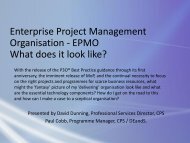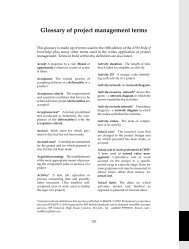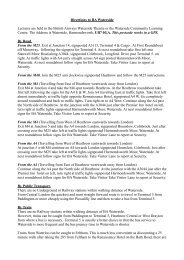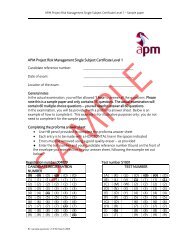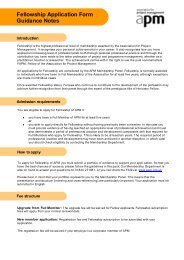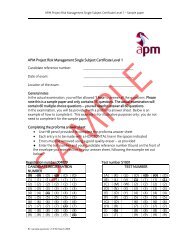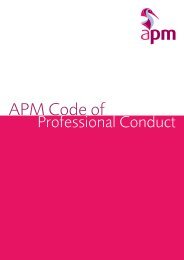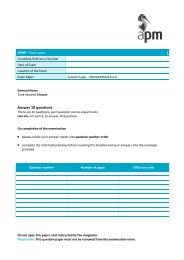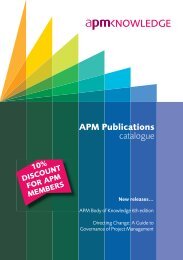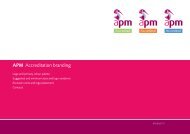Introductory Certificate sample paper - Association for Project ...
Introductory Certificate sample paper - Association for Project ...
Introductory Certificate sample paper - Association for Project ...
Create successful ePaper yourself
Turn your PDF publications into a flip-book with our unique Google optimized e-Paper software.
4 APM <strong>Introductory</strong> <strong>Certificate</strong> in <strong>Project</strong> Management – Exam <strong>paper</strong><br />
14. Which one of the following statements is true<br />
a. Risk events always have beneficial effects on the project.<br />
b. Risk events can have either beneficial or detrimental effects on the project.<br />
c. Risk events always have detrimental effects on the project.<br />
d. Risk events have neither beneficial nor detrimental effects on the project.<br />
15. Which one of the following is a generic project management process<br />
a. Risk management.<br />
b. Learning and closing.<br />
c. Staff appraisal.<br />
d. Quality management.<br />
16. Portfolio management could best be described as:<br />
a. the co-ordinated management of related projects, including related business-as-usual<br />
activities.<br />
b. the <strong>for</strong>mal process through which changes to the project plan are approved and<br />
introduced.<br />
c. the identification of the benefits (of a project or programme) at an organisational level and<br />
the tracking and realisation of those benefits.<br />
d. the selection and management of all of an organisation's projects, programmes and<br />
related business-as-usual activities, taking into account resource constraints.<br />
17. Who is primarily responsible <strong>for</strong> ensuring the implementation of <strong>for</strong>mal change control<br />
a. Key stakeholders.<br />
b. The <strong>Project</strong> Manager.<br />
c. The project sponsor.<br />
d. The project team.<br />
18. Once a proposed change is logged it should then be:<br />
a. accepted, rejected or deferred.<br />
b. accepted and the project plan updated.<br />
c. sent to the project sponsor <strong>for</strong> approval.<br />
d. assessed to determine its potential impact.<br />
19. Which one of the following is NOT typically associated with a project’s context<br />
a. The issues and areas that matter to stakeholders.<br />
b. Technical, social or political considerations.<br />
c. The environment in which the project is being carried out.<br />
d. The sequence and dependencies of activities.



